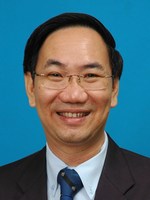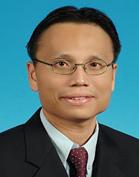Foreword by President

It is with much anticipation that I deliver this foreword for the UTAR R&D Annual Report as we welcome another exciting year of progress ahead.
This year has seen many achievements as a result of the University’s concerted effort towards teaching and research excellence especially in in the area of research and development in collaboration with our partners, the industry and the government.
I am also very pleased to see our researchers’ commitment and contribution towards their research projects for the betterment of our environment and the society – upholding the University’s principle of “By the people, for the people”. As a result, our researchers have attained sponsorships, awards and recognitions for their publications and research papers.
As a university that encourages commitment to lifelong learning, UTAR also aims to provide a platform where research and development activities can be conducted in ways that will help broaden the horizons of knowledge and that will provide important answers for the improvement of the quality of the world we live in. We shall continue to strengthen our R&D with cross-disciplinary research, diversification of research funding, publication and patent filing, commercialisation and consultancy, and international collaborations.
UTAR currently has 25,000 students and an alumni base of more than 53,000. We have also signed 285 memorandum of understanding with foreign and local universities and industry partners to facilitate mutual educational visits, academic and student exchanges, and joint developments in teaching methodologies and research.
UTAR was ranked No. 14 in the Times Higher Education Young University Rankings 2017: Millennial universities; Top 150 in the Times Higher Education Young University Rankings 2017, and awarded self-accreditation status by the Malaysian Qualifications Agency (MQA) in March 2017. UTAR was also awarded 5 Stars (Excellent) in the Emerging University category by the Rating System for Malaysian Higher Education Institutions 2017 (SETARA’17). At the Sin Chew Business Excellence Awards 2017, UTAR won the CSR Excellence Award 2017. To top it all, UTAR is now ranked #99 in the Times Higher Education Asia University Rankings 2018 and Top 600 in the Times Higher Education World University Rankings 2018. We are indeed grateful to all the staff, students, partners, and sponsors for their support and contributions.
The previous year was a hive of meaningful projects and activities with some of our researchers. It is with great pleasure that I present to you the following highlights in the UTAR R&D Annual Report 2017:
- Cumulative internal research funds awarded totalled RM49.81 million as of 31 December 2017, an increase of 15 percent since 2016.
- Cumulative external research funds solicited as of 31 December 2017 amounted to RM46.38 million, an increase of 11 percent since 2016.
- Scholastic publications cited (cumulative) in Scopus rose from 2,601 in 2016 to 3,110 in 201
- The cumulative number of citations of publications in Scopus increased from 16,397 in 2016 to 23,586 in 2017.
Showcasing the excellence of our staff and postgraduate students are the following achievements:
The abovementioned illustrate the few of the many accomplishments UTAR has achieved. UTAR is certainly looking forward into expanding research efforts, expertise and resources to help develop a cooperative research framework with other institutions and professions.
I am very grateful to everyone who has dedicated his/her time, efforts and commitment to the R&D initiatives and to the University. Let us all stay motivated to pursue further collaborative research projects that will enable us to seek improvement for the University and the society.
Thank you.
With warm regards,
Ir Prof Academician Dato’ Dr Chuah Hean Teik
Foreword by Vice President RDC

No university in this world can succeed without focusing on research and development (R&D). A university is supposed to be the place that creates new knowledge, disseminates knowledge and applies the knowledge for the benefit of mankind. R&D is vital for this role of a university. In a globalised world today, national boundary has become less significant in terms of flow of information, goods and people. As a country, we are in competition with the rest of the world to create more value from human and other resources that we have. The increase in such value cannot come about without R&D. Universities being the frontrunners in R&D in this country have a very important role to play and UTAR is determined to play the role well.
Realising the importance of encouraging research activities among its academics, UTAR has, since its establishment as a university in 2002, at the institutional level put in place the necessary framework to encourage research, such as the introduction of the UTAR Research Fund, research policies and guidelines, the UTAR Global Research Network with International Collaborative Partners from universities internationally and locally, the establishment of research centres focusing on several niche areas and the signing of numerous MOUs with local industry partners and renowned international universities to encourage research collaborations. Trainings to improve and enhance research skills and other necessary competencies of UTAR academics are also conducted regularly. A strong research culture has been cultivated and enhanced in UTAR.
UTAR was ranked No. 14 in the Times Higher Education Young University Rankings 2017: Millennial universities; Top 150 in the Times Higher Education Young University Rankings 2017, and awarded self-accreditation status by the Malaysian Qualifications Agency (MQA) in March 2017. UTAR was also awarded 5 Stars (Excellent) in the Emerging University category by the Rating System for Malaysian Higher Education Institutions 2017 (SETARA’17). At the Sin Chew Business Excellence Awards 2017, UTAR won the CSR Excellence Award 2017. To top it all, UTAR is now ranked #99 in the Times Higher Education Asia University Rankings 2018 and Top 600 in the Times Higher Education World University Rankings 2018.
In the past one year UTAR has continued to strengthen its pursuance of certain key milestones as set in the UTAR 10-year Strategic Plan (2013 – 2022). Several initiatives that have been set up since 2013 gained further momentum. It is with pleasure that I present to you the following achievements as of 31 December 2017:
- The 1-day UTAR MOHE Grant applications Evaluation Workshop 2017 involving 50 researchers (Associate Professor and Professor) who qualify as panel evaluators was held on 18 February 2017 (Saturday) concurrently at both Sungai Long and Kampar campuses due to the increase in the number of MOHE FRGS 1/2017 grant applications. The Workshop resulted in thirteen (13) applications with a total funding of RM835,810.00 being approved in the MOHE Grants Application Phase 2017;
- 421 active and 73 student participants completed the UTAR Undergraduate Research Scheme (URS);
- 3 active UTAR Post-Doctoral Research Scholarship (PRS) scholars;
- UTAR Research Publication Scheme (RPS) amounting RM1,232,832 was awarded to researchers in recognition of 536 of their high quality publications in cited journals;
- Establishment of 4 new Research Centres namely, Centre for Research on Communicable Diseases (CRCD), Centre for Railway Infrastructure and Engineering (CRIE), Centre for Power Systems and Electricity (CPSE) and Belt & Road Strategic Research Centre (BRDRC). This brings the total number of Research Centres to 32.
Professor Dr Lee Sze Wei
Vice President (R&D and Commercialisation)
